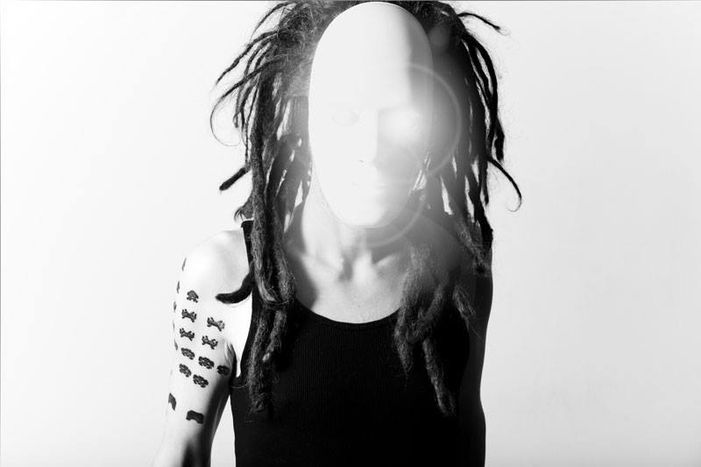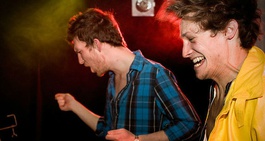
Berlin Jukebox: Erich Lesovsky
Published on
Translation by:
 Danny S.
Danny S.
There are plenty of musicians with masks, but do they also blink? The self-designated Berliner Erich Lesovsky makes his music with electronic devices, into which he breaths life through the use of toys, lights and firecrackers on stage. Today's Berlin Jukebox: transparent and melodic electro sounds that won't only make you move your feet, but also use your brain. Turn on.
One wouldn't necessarily make the connection between plastic toys, flashing disco balls and fireworks with electronic music. But those who have seen one of Erich Lesovsky's live sets knows that techno can be something other than a monotonous sound loop. Erich, who has been producing electronic music since 1995, intentionally eliminates all preconceived musical notions and classifications; anything of the sort would limit him when he makes music. What started out as acoustic guitar, punk rock, reggae and ambient music has transformed itself into extremely transparent, danceable sounds, which are distinguished by multiple melodies, unexpected sounds and a sophisticated beat.
Erich Lesovsky live at the music festival "Plötzlich am Meer" (2013).
Erich had his first live performance in 1988 at the ARM Club&Lolita Bar in Kassel, back when he still used discs and an old sound sampler. In the meantime, he has developed his own synthesizers, such as the Minimum Theremin or the Atari Punk Console in a Nintendo Gameboy shell, and makes apperances at all important clubs in Berlin. His releases are spread out across various labels such as Parquet Recordings, Stil vor Talent, Burlesque Musique or Univack Records. With Circat Music, he has his own label for experimental music. All things considered, people should be careful about claiming that techno is a stupid cacophany of drones without any musical substance! Erich demonstrates in his live sets that electronic music is not only thought-out and sophisticated, but also that it simultaneously penetrates the body with such force you will fall into a trance.
Cafébabel: How did you come up with the idea to wear a blinking mask?
That arose out of my bricolage with LEDs, but how I chose a mask in the end, I can't recall. So now I have two LED eyes and a mouth that I can even illuminate with three different colors. In general, masks, makeup or costumes are always effective on stage.
Cafébabel: How important are theatrics for you in your live sets?
For the transition between two live acts after the break, I usually utilize toy sounds. People immediately know when they see a bubble gun, that something's about to happen. Why else are we on stage? That's what I find so stupid about electronic music; you usually only have to turn a number of buttons. Naturally that has got its advantages because then it's really about the music itself. But it's pretty boring to watch. I personally like the German rock band Bonaparte - crazy stage shows all the way to the end of the night! It's always good when someone on stage goes berserk: it's liberating for the audience, because it makes it easier for them to merge with the experience. And for that, you don't necessarily have to bite off a bat's head.
Erich Lesovsky, Regenmacher (2011).
Cafébabel: What musical elements determine your music?
I like melodies and very diverse sounds; rhythm serves as more of a foundation. In my tracks, sounds constantly shift, ports create reverberation and just as they begin to fade, a new sound springs to life. You can change rhythm as long as you like, but no one notices and it doesn't cause distress. But the moment a melodie gets added into the mix, everything changes. Rhythm becomes a lot more neutral; for me, emotion is lacking, which can only be dictated by harmonies. Music should always try to find a balance between a specific groove and the emotions that want to be conveyed. In my case they tend to be more melancholic. In the past years I've actually leaned more frequently toward hymns.
Cafébabel: The electronic music scene in Berlin is the biggest and liveliest worldwide. That translates into a lot of freedom, but also a lot of competition?
I usually break my opponent's arms, so it has become less of an issue with time. (laughs) Nah, it's actually a really cool exchange. It's all about the discussion, technology and mutual critique. In the end, quality and stamina are the deciding factors.
Erich Lesovsky, No Stone Should Be Left Upon (2012).
Cafébabel: How do you see the future of electronic music in Berlin?
There's still a lot of room to grow, if one wants to experiment. The technological possibilities are always getting better and also the fusion of different music genres is progressing. A lot of people don't want to experiment, though, but would rather emulate what once was. If you listen to the Beatport-Charts everything is pure repetition. That's how it is with trends; sometimes House with a lot of vocals is hip, then Minimal, and then there's something completely different. In the meantime, electronic music has become a fitting business for many. Last year, for example, discosounds and 80s synthesizers were trending. My guess is that it will continue, but I'm out of that circle now - luckily! I don't read any scene magazines, rarely listen to electronic music, and don't know any DJ charts. Sometimes I like to listen to punk rock for days before making a new techno track.
CAFÉBABEL BERLIN has turned on the jukebox
 Fed up with the eternal sunshine of Top 10 hits, radio loops and Spotify playlists? From April 2014 onwards, we will introduce you to young musicians, DJs and live acts from Berlin who still have the musical power to surprise you. Check out the jukebox! More tracks and playlists on Facebook and Twitter.
Fed up with the eternal sunshine of Top 10 hits, radio loops and Spotify playlists? From April 2014 onwards, we will introduce you to young musicians, DJs and live acts from Berlin who still have the musical power to surprise you. Check out the jukebox! More tracks and playlists on Facebook and Twitter.
Translated from Berlin Jukebox: Erich Lesovsky


